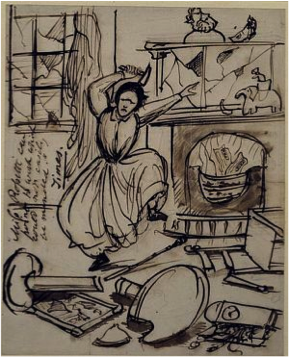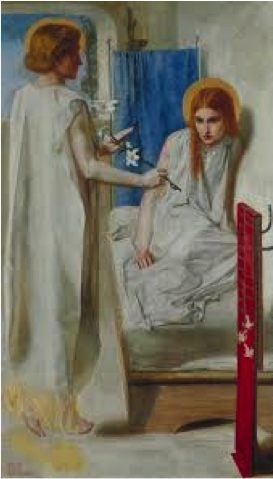By Alice Theobald
In a period noted for its ostensible conservatism and censorship of linguistic taboos, Christina Rossetti is often taken as paradigmatic of this aversion towards the open expression of sensuality and female sensation. However, her religious poetry in fact displays a marked tendency towards images of physical desire, appropriating the language of erotic desire to religious zeal. While ecclesiastical tradition is decidedly patriarchal, Rossetti’s devotional work sees her navigate her physical yearnings, amalgamating sensual lusts with spiritual fervour. Although open sensuality was often condemned as anathema to piety, Rossetti not only validates her passionate impulses but presents them as the very means of cultivating her religiosity.
The concept of ‘aestus amoris’ (‘the heat of love’) prevalent in classical love poetry and elegy establishes an amatory mood in her religious work. Rossetti repeatedly uses flame imagery and charged verbs such as ‘blaze’ – even using the term ‘flame’ as a verb – to foreground the vital intensity of her passion. It seems particularly worthy of note that she rejected two marriage proposals during her lifetime. Clearly possessing sensual feelings, it is as if Rossetti scorned the gender-normative standards of Victorian society, choosing instead to redirect her eroticism towards a transcendental force. Channelling her sensual yearnings into religious devotion, the physicality of Rossetti’s religious ardour was somewhat akin to the notion of affective piety. Accordingly, Rossetti was in fact medically diagnosed with (at least by Victorian standards) ‘religious mania’ in early adulthood such was her spiritual zeal.
In line with the prophetic and scriptural tradition of Christianity, Rossetti uses the power of her words and poetics (like the glorified Biblical ‘logos’) to express commitment to God. Her impassioned spiritual conviction is readily apparent in the frequently hyperbolical nature of her outbursts: ‘Allow for my plea!’, ‘O Jesus, drink of me!’, ‘O Jesu, better than Thy gifts/ Art Thou Thine only Self to us!’. Although practising an ascetic lifestyle, the dynamism of Rossetti’s poetic voice is at distinct odds with the puritanical and docile image she projected of herself. The attribution of this bold temperament brings to mind the humorous portrait sketched by her renowned brother, pre-Raphaelite painter Dante Gabriel Rossetti, entitled ‘Christina Rossetti in a Tantrum’ – a state we would seldom apply to a meek virtual-invalid who earlier modelled for her brother as the Virgin Mary.

There is, however, a slight paradox in that the very vehemence and animation of her zeal leads to an almost incapacitating inertia: ‘The heart faints and the spirit faints/ For only Thee all-Glorious,/For Thee, O only Lord, for Thee’. As if plunged into a kind of Dionysian frenzy, Rossetti’s passion is simultaneously assertive and self-renouncing. Willing herself into a physical bond with her ‘Lord’, Rossetti seems to desire that her identity is transferred to and consumed by that of her ‘God’. As suggested by the chiastic phrase ‘I, Love, am Thine; Thou, Lord, my God’, Rossetti considers herself and God to be bound up in a mutually-dependent relationship that leaves their respective identities almost synonymous or interchangeable in their unity.

The sense of necessity accompanying Rossetti’s religious desire is conveyed through language denoting primal instincts and needs. Characterising herself as physically ‘athirst’, she constantly describes how ‘For thee I thirsted’ and depicts herself as afflicted with physical and emotional pain in her separation from God. Nevertheless, this very anguish becomes the source of her vigour. Perversely empowered through her asceticism, Rossetti serves as an apt embodiment of the self-denying and martyr-like role designated for women by contemporary society. Enacting her most powerful declaration of selfhood through self-abnegation, the disjuncture between her bold voice and the essential self-renouncement towards which it strives (‘All mine is Thine’) is representative of the condition of women at large whose fervent desires are expressed – quite antithetically – as a melancholic ‘moan’ or ‘cry’.
Her piety is often characterised in terms of a ‘hunger’ or ‘thirst’ and the recurrence of the present participle ‘craving’ throughout her work demonstrates how actively and insatiably she yearns for religious fulfilment. The sonnet form frequently adopted grounds her work within a literary tradition of love poetry, exploiting tropes such as the ‘delicate rose’ to which she compares herself. The metonymic ‘heart’ abounding throughout her oeuvre foregrounds the centrality of sensuality in the realization of her spiritual devotion. Spousal imagery is also manifested in declarations such as ‘[s]o spreads my heart to thee/Unveiled utterly’ and ‘Thy fainting spouse’. While the sibilance here reflects the ease with which she gives herself to God, the rhyming couplet stresses how ‘utterly’ open her submission is. Additionally, the verb ‘Unveiled’ is reminiscent of marriage terminology while the simple declaration ‘I to thee’ echoes traditional wedding vows. This conjugal imagery assumes a particularly sensual mood with the onomatopoeic diction ‘moan’ and anatomical references to ‘thy face’. Adopting a supplicatory stance as she ‘bows’ her ‘strength in fragrance at His feet’, she wholly submits to the divinity, craving the relationship of a ‘bridegroom’ as she praises ‘God, from the breast’ – symbolically intimating the yearning ‘love and joy’ she invests in Him.
While Rossetti embraces self-sufferance and docility in her outward demeanour, she not only throws herself wholeheartedly into a physical relationship with God (frequently appealing to his incarnate form as the ‘Face of Jesus Christ’, equated with the very ‘Face of Love’). While mortal relationships present only limitations and shortcomings, her transcendental love is beyond human fallibility. Furthermore, mortal love is unstable and wavering whereas she not only finds permanence in her ‘Dear Lord’ but considers their relationship as reciprocal, cherishing that ‘Thou didst set Thy heart upon,/Me, even me’. The repeated qualification ‘even me’ that initially suggests Rossetti’s perception of her own inferiority in fact seems somewhat insincere, even elaborated in the phrase ‘Thy little one’. Rossetti may characterise herself as meek and mild, but the boldness of her poetry with its coy interjections – ‘Shall Thy Heart crave for my heart […]?’ – is a testament to her veiled audacity and the patent flagrancy of her religious zeal and, above all, sublimated sensuality.
References
Isobel Armstrong, Victorian Poetry: Poetry, Poetics and Politics (London: Routledge)
Antony H. Harrison, Christina Rossetti in Context (North Carolina: North Carolina University Press)
Dolores Rosenblum, Christina Rossetti: The Poetry of Endurance (Chicago: Southern Illinois University Press)
Suzanne M. Waldman, Demon and the Damozel: Dynamics of Desire in the Works of Christina Rossetti and Dante Gabriel Rossetti (Athens: Ohio University Press)
